Ukraine's Cultural Crucible Embraces The Art Of War
A brick-sized printer head scoots back and forth, spraying a furled plastic banner with the silhouette of a mythical fighter pilot.
Next door a drying glossy poster shows a tractor carting off a crippled Russian tank.
A nearby computer is loaded with a caricature of a slain invader. From his skeletal remains sprouts the stem of a sunflower, a national emblem of Ukraine.
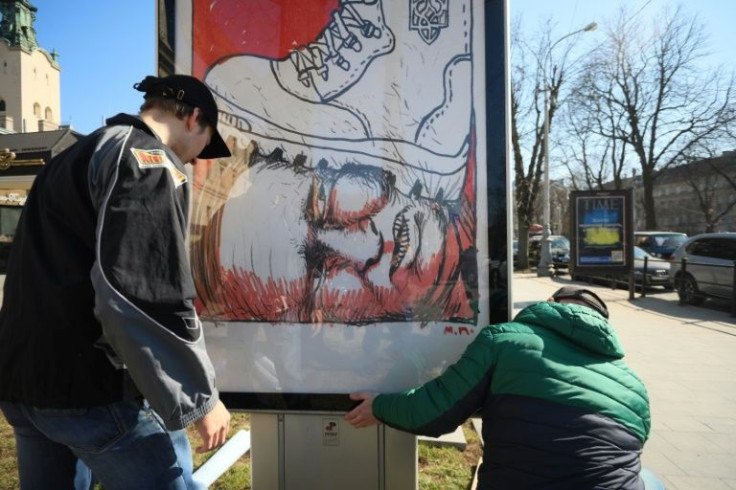
Since Russia invaded Ukraine three weeks ago, the Zovnishnya Reklama print works has been a publishing hive for unashamedly patriotic billboards, posters, banners and stickers.
The back alley studio -- enveloped in the heady odour of ink -- is one of many outlets flooding the western city of Lviv with wartime messaging urging Ukraine on to victory.
"For us it is not propaganda," says manager Volodymyr Kotovych, 26, clambering over reams of industrial paper stacked like logs on the workshop floor.
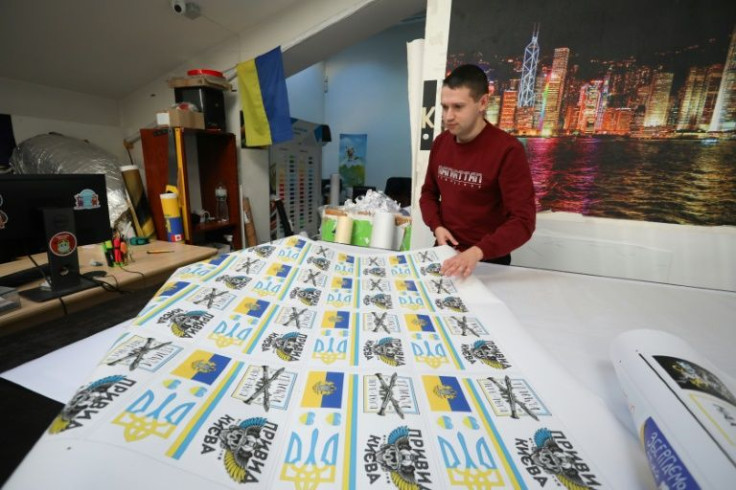
"These are patriotic slogans that motivate our people and our soldiers to have a better fighting spirit."
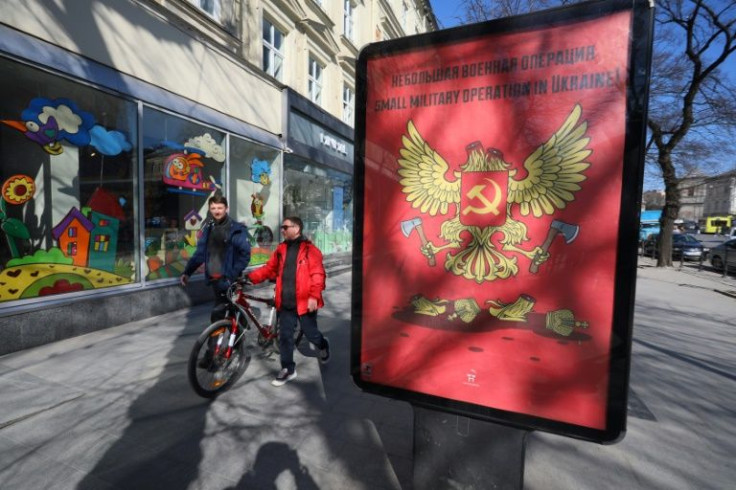
Lviv is known as the cultural capital of Ukraine. Residents gamely concede the capital Kyiv is the heart of the country but contend their hometown houses the nation's soul.
In peacetime the city advertised its artful anima everywhere. Walls were plastered with invitations to stage performances and gallery exhibitions. The tunes of musical buskers overlapped in the cobbled streets.
But since Russia launched its invasion on February 24, the city of 700,000 has been decked with graphic and triumphant calls to arms -- from official channels, private enterprises and guerilla artists.
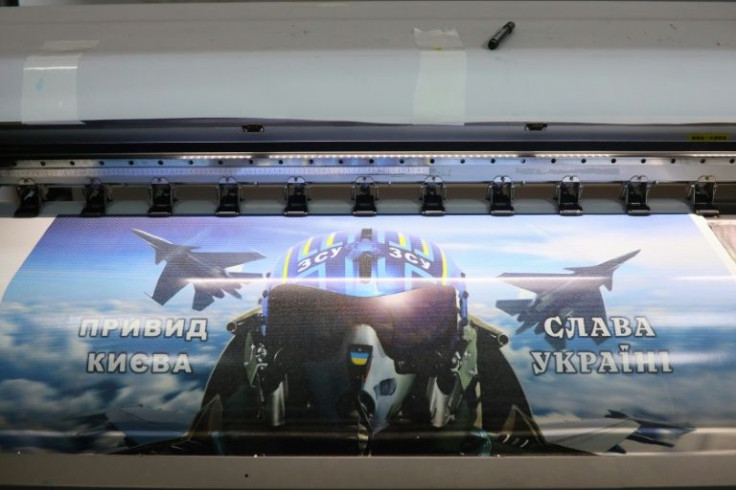
One billboard depicts Russian President Vladimir Putin's crumpled face in the dirt under a sketched boot emblazoned with the Ukrainian trident.
Another apes the style of World War II propaganda -- a snarling Russian bear is torn asunder by a smaller vicious badger sporting the yellow armband of the Ukrainian armed forces.
"Whoever attacks us with the sword will die by that sword," it declares, soliciting donations for the war effort.
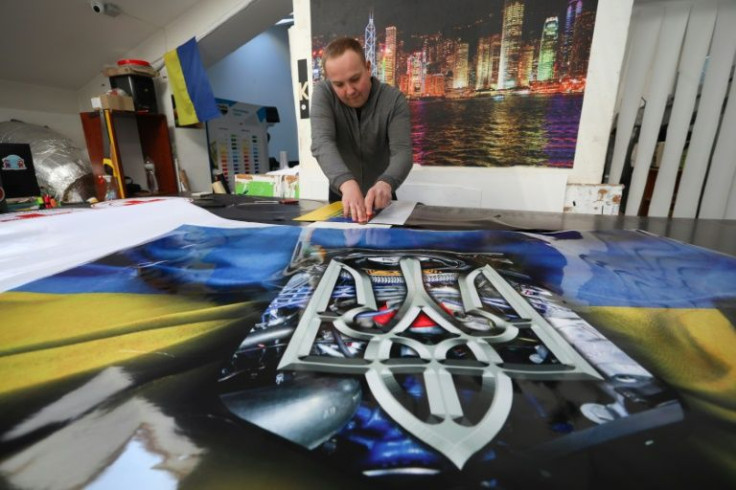
From the opera theatre, three billowing drapes depict the folk heroes of the conflict.
The first lauds the "Ghost of Kyiv", a feted fighter ace. Another heralds border guards who died at their posts. The third, an engineer who martyred himself to thwart a Russian armoured advance.
The feats -- and even existence -- of some of the men depicted is contested but all are rousing characters in a story Ukraine is telling itself about the path to victory.
Kotovych clearly feels there is a kernel of emotional truth in the tales, even if they aren't entirely accurate.
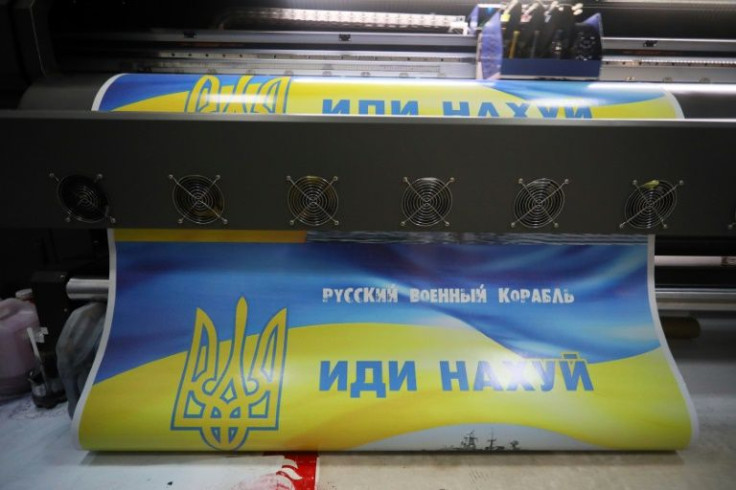
The outlet he manages has given over 80 percent of its time to making such prints, as traditional advertising work has dried up under the strictures of wartime.
For him, the distinction between their work and propaganda is the grassroots demand for expressions of solidarity during a national trial.
"Propaganda happens in Russia, where people are told one thing but the truth is something else entirely," he said.
"This is done in the service of the people."
Elsewhere in Lviv, there is evidence that Kotovych is correct -- spontaneous art has sprung up supporting Ukraine in the war.
A city centre archway is glued with an A4 poster of the Russian eagle, slashed across by the Ukrainian national colours of blue and yellow.
An overpass is stencilled with the image of a Molotov cocktail -- a symbol of the popular resistance to Russia's invasion.
Sheafs of photocopied flyers are crudely taped around gutters with the black and white image of a soldier, his brow furrowed in determination, as jets soar overhead.
Tourist shops along the narrow routes of the city centre are already marketing the emerging art to the public, further proof of its popularity.
At Kram, a souvenir boutique lined with merchandise, tote bags bear the image of President Volodymyr Zelensky, his clenched fist held high.
Chocolate bar wrappers are inked with portraits of national poet Taras Shevchenko in an army uniform.
"Propaganda or not, the Russians came to our land and we need to defend ourselves," says 21-year-old cashier Mykhailyna Yarmola.
In peaceful times Lviv -- just 70 kilometres (45 miles) from the Polish border -- was a tourist hotspot drawing in droves of visitors.
Now the traffic is overwhelmingly outgoing.
The UN says around 3.5 million have fled the country since the war began, leaving fewer and fewer to be buoyed up by arts and trinkets proffering hope.
Yarmola gestures at a confectionary branded with a message of defiance towards Russian warships -- their most popular item.
"People take them as a gift or as a souvenir if they are leaving for elsewhere, to Poland, as refugees," she says.
© Copyright AFP {{Year}}. All rights reserved.





















